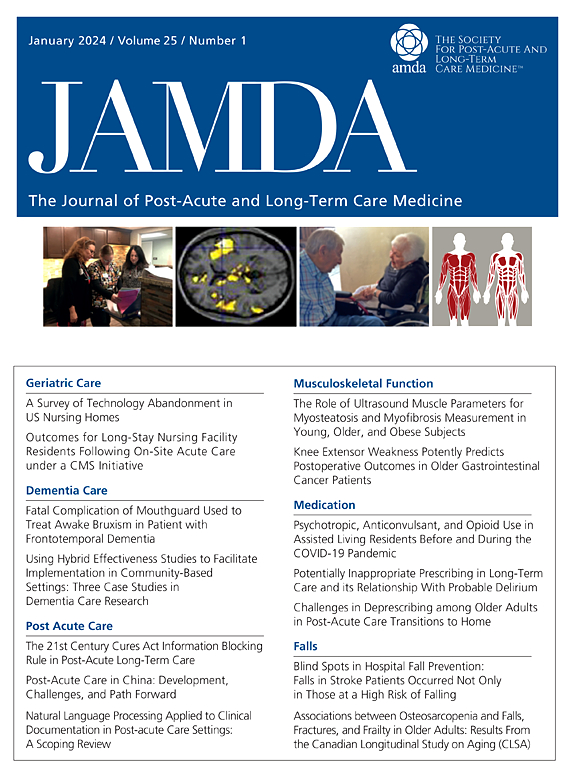Effectiveness of My Tools for Care-in Care: A Pragmatic Randomized Controlled Trial
IF 4.2
2区 医学
Q2 GERIATRICS & GERONTOLOGY
Journal of the American Medical Directors Association
Pub Date : 2025-03-13
DOI:10.1016/j.jamda.2025.105484
引用次数: 0
Abstract
Objectives
Few supports exist for family/friend care partners when the care recipient is a person living with dementia in a care home. This study assessed the effectiveness of My Tools for Care-In Care (MT4C-In Care), a self-administered, web-based psychoeducational intervention.
Design
The overall study was a mixed methods pragmatic randomized controlled trial, with concurrent process evaluation and an active (educational) control. The intervention group received a link to MT4C-In Care for 2 months.
Setting and Participants
Participants were eligible if they were an adult (aged ≥18 years) who provided care to an older person (aged ≥65 years) living with dementia in a care home in Canada (Alberta, Saskatchewan, Manitoba, or Ontario). An email address and internet access were required to participate.
Methods
Process evaluation included a study participation tracking form and a checklist to assess use of MT4C-In Care. We completed telephone interviews (February 2020 to October 2021) at baseline, 2 months, and 4 months to assess outcomes of social support, hope, grief, self-efficacy, loneliness, and mental health. In an intention-to-treat analysis, generalized estimating equations models were used to assess intervention impact, adjusting for covariates. Sensitivity analysis assessed whether exclusion of nonusers impacted the results.
Results
Participants (N = 234) were primarily white women, and spouses or an adult child of the person living with dementia. No effect between groups was observed for the primary outcome (mental health). We observed a small benefit of MT4C-In Care for a secondary outcome, social support. Use of MT4C-In Care within the intervention group was low (∼1 h/mo). Dropping nonusers from the analysis did not have a substantial impact on the main conclusions.
Conclusions and Implications
Future research will explore use of MT4C-In Care by more diverse participant groups, and will clarify its core mechanisms, advancing understanding of impacts of psychoeducational interventions.
我的护理工具的有效性-护理:一项实用的随机对照试验。
目标:当护理对象是住在养老院的痴呆症患者时,对家人/朋友护理伙伴的支持很少。本研究评估了My Tools for Care- in - Care (mt3c - in - Care)的有效性,这是一种自我管理的基于网络的心理教育干预措施。设计:整个研究是一项混合方法实用的随机对照试验,采用并行过程评价和主动(教育)对照。干预组接受为期2个月的MT4C-In护理链接。环境和参与者:如果参与者是在加拿大(阿尔伯塔省、萨斯喀彻温省、马尼托巴省或安大略省)的养老院为患有痴呆症的老年人(≥65岁)提供护理的成年人(≥18岁),则符合条件。需要电子邮件地址和互联网接入才能参与。方法:过程评估包括研究参与跟踪表和检查表,以评估MT4C-In护理的使用情况。我们在基线、2个月和4个月完成了电话访谈(2020年2月至2021年10月),以评估社会支持、希望、悲伤、自我效能、孤独和心理健康的结果。在意向治疗分析中,使用广义估计方程模型来评估干预影响,调整协变量。敏感性分析评估排除非使用者是否会影响结果。结果:参与者(N = 234)主要是白人女性,以及痴呆症患者的配偶或成年子女。在主要结果(心理健康)方面,各组之间没有观察到任何影响。我们观察到MT4C-In护理在次要结果,社会支持方面有一个小的好处。干预组MT4C-In Care的使用率较低(约1小时/月)。从分析中剔除非用户对主要结论没有实质性影响。结论与启示:未来的研究将探索更多不同参与者群体对MT4C-In护理的使用,并将阐明其核心机制,促进对心理教育干预影响的理解。
本文章由计算机程序翻译,如有差异,请以英文原文为准。
求助全文
约1分钟内获得全文
求助全文
来源期刊
CiteScore
11.10
自引率
6.60%
发文量
472
审稿时长
44 days
期刊介绍:
JAMDA, the official journal of AMDA - The Society for Post-Acute and Long-Term Care Medicine, is a leading peer-reviewed publication that offers practical information and research geared towards healthcare professionals in the post-acute and long-term care fields. It is also a valuable resource for policy-makers, organizational leaders, educators, and advocates.
The journal provides essential information for various healthcare professionals such as medical directors, attending physicians, nurses, consultant pharmacists, geriatric psychiatrists, nurse practitioners, physician assistants, physical and occupational therapists, social workers, and others involved in providing, overseeing, and promoting quality

 求助内容:
求助内容: 应助结果提醒方式:
应助结果提醒方式:


